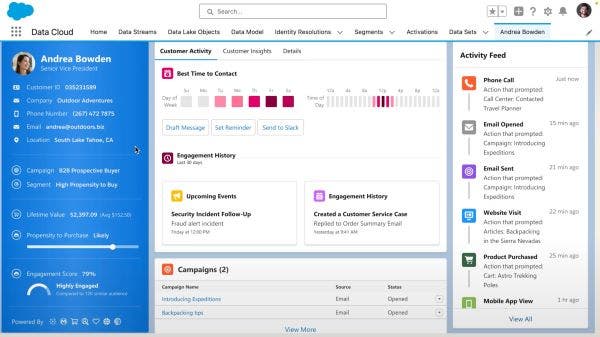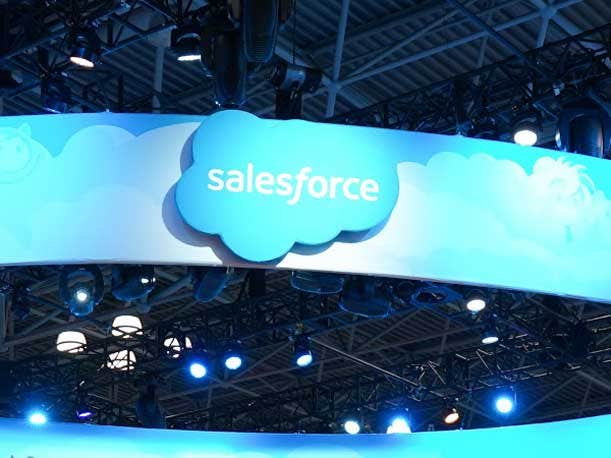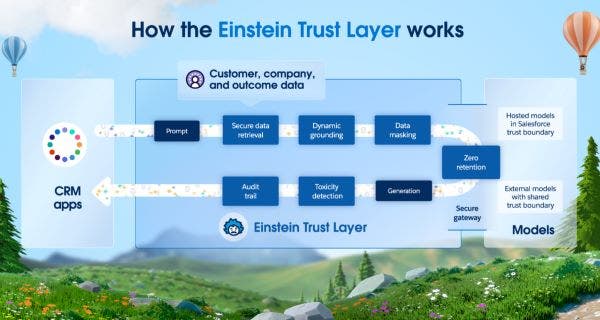Salesforce Dreamforce 2023: CEO Says Other AI Vendors Use ‘Your Data To Make Money’
‘These LLMs are hungry for our data,’ Salesforce CEO Marc Benioff says.

Salesforce CEO and co-founder Marc Benioff made a series of bold accusations in setting up his company as the most trustworthy vendor of enterprise-grade generative artificial intelligence products and services, alleging that other GenAI vendors use customer data for model training and accept incorrect answer generation.
Benioff accused other, unnamed GenAI vendors of stealing some of the training data for their large language models (LLMS) and wanting customer data for their own benefit. Microsoft, Amazon and Google are considered some of the largest AI vendors.
“These LLMs are hungry for our data,” Benioff said Tuesday during the San Francisco-based customer data platform (CDP) vendor’s annual Dreamforce event. “It’s how they get smarter. The LLM companies are just algorithm companies. They only work when they have data. And the data that they get, mostly they stole it. Or they just go out onto the net and get whatever data they can get.”
[RELATED: Salesforce CEO: We Are ‘Transforming From Being Not Only The No. 1 CRM, But To The No. 1 AI CRM’]
Salesforce AI At Dreamforce 2023
Benioff continued: “And the next set of data they want is your data. The corporate data. That will make them even smarter.”
The CEO also warned attendees against trusting vendors with business-to-consumer (B2C) businesses who see customer data as a revenue-generating opportunity.
“For a lot of companies that you’re dealing with, and for a lot of companies that you’re partnering with, and a lot of companies that you’re looking at or that you work with – especially on the B2C (business-to-consumer) side and on the consumer side – you know how they operate,” he said.. “I don’t have to tell you. I do not have to explain to anybody here – it is a well known secret at this point – of that. They’re using your data to make money. That is not what we do at Salesforce. Your data isn’t our product. You control access to your data.”
CRN has reached out to Salesforce for further comment on Benioff’s remarks.
Dreamforce runs through Thursday in San Francisco.
Benioff also attacked the phenomenon of AI hallucinations – that is, AI models generating incorrect information as if it was correct.
“They call them hallucinations. I call them lies,” he said. “These LLMs are very convincing liars. They really are.”
Despite his railing against the dark side of GenAI, Benioff also touted the benefits of the technology and even announced new offerings in the area from Salesforce itself, including the Einstein 1 Platform, which promises safe connection of any data to build AI-powered application
“We want to build the trusted AI platform for customer companies so that everyone is an Einstein and more productive,” Benioff said. “We think that trust is the highest priority here. We want to turn it over to you – but only with trust. We want to make sure it’s integrated. We want to make sure it’s intelligent. We want to make sure it’s automated. We want to make sure it’s low code and no code. We want to make sure it’s open. … This is our life’s work. This is what we’ve been doing for 25 years.”
Here’s more of what Benioff had to say at Dreamforce 2023.

An AI Revolution
We’re in this AI revolution. It’s going to impact who we are. It’s going to impact how we operate. But it’s going to bring us back to our core values.
We know that we’re in this AI revolution. For those of you who have been attending Dreamforce for 10 years, you’ve been seeing this emergence of Einstein and this predictive technology.
Salesforce already is the No. 1 artificial intelligence platform used around the world. Incredible. … But what’s amazing is this generative wave has really started now.
Now, we’re in that about nine months. And the generative wave is happening around the world.
And we’re about to hit another wave with autonomy and with agents, and we’re eventually going to get to artificial general intelligence. … But it’s our values that are going to guide us to those directions.
And that’s where we have to start thinking about – what are we doing with this technology?
You know, it comes back for us here at Salesforce at this Dreamforce keynote. Hey, we’re going to the Customer 360. We want a single source of truth for our customers. We’ve been putting our data together, our networks together, our applications together. … It’s been a wave of innovation over 25 years. No question.

The AI Trust Gap
There is no question that this AI opportunity is going to change everything …. Everything is going to shift.
At the same time, like a lot of new technologies in our industry, there appears to be this thing called a trust gap. Somehow, there might not have been as much trust built into these technologies as you might have expected. Not unusual in our industry.
But we realize we’ve got islands of information that are out there. We’re working with these LLMs. Where is this data going when I’m using my LLM? Where did that data just go? Or that query? What is happening? Well, it’s ingesting. It’s gone. It’s using it to get smarter. And you’ll never see your data again.
Not exactly how we operate in the enterprise world. These LLMs are hungry for our data.
It’s how they get smarter. The LLM companies are just algorithm companies. They only work when they have data. And the data that they get, mostly they stole it. Or they just go out onto the net and get whatever data they can get.
And the next set of data they want is your data. The corporate data. That will make them even smarter.
But so many CEOs and CIOs and CTOs I’ve spoken to all over the world say, ‘Whoa, I’m not ready to turn over all my data to these public LLMs who are going to try to make all my systems smarter.’ It’s really an interesting thing.
Hallucinations Are ‘Lies’
The other thing that’s really interesting is that these things are good, but they’re not great. You get a lot of answers that aren’t exactly true.
They call them hallucinations. I call them lies. Put in my data. Put in my question. I like to ask some of my favorite questions, like, who’s Marc Benioff? And I’m like, ‘That’s not who I am. That’s amazing.’
But it’s very convincing. These LLMs are very convincing liars. They really are. It’s amazing.
And, of course, they can turn very toxic very quickly. Not necessarily great in a customer situation. Not necessarily that great in an enterprise or employee situation.
But we realize this is a phenomenal opportunity for the future. Someplace we all want to get to. We want to build new companies. We want to innovate. We want to build new, great new applications, verticals.
OK, we’re going to get some trust in there somehow. But we’ve got this disconnected data and these different APIs (application programming interfaces) and all these different types of vendors.
We’re going to have to stitch this stuff together. And will we get trust out of it at the end of the day? Will we really know what we’re going to result with? I’m not so sure.

Einstein 1 Platform
At Salesforce, our amazing engineering team … and my amazing product teams, they’ve been saying now for last nine months… And as we start to head towards autonomous agents, they said, ‘We need to do something very, very different.’
Because before we turn all this technology over to you, and say that we are going to stand behind it with our values. We’re going to add … Einstein 1 Platform.
And this Einstein 1 Platform … We want to build the trusted AI platform for customer companies so that everyone is an Einstein and more productive. … We think that trust is the highest priority here.
We want to turn it over to you – but only with trust. We want to make sure it’s integrated. We want to make sure it’s intelligent. We want to make sure it’s automated. We want to make sure it’s low code and no code. We want to make sure it’s open. … This is our life’s work. This is what we’ve been doing for 25 years.

An Integrated Platform
What we want to do is build an integrated platform, No. 1.
So we have these great apps. Sales Cloud and Service Cloud and Marketing Cloud and Commerce and Analytics and platform. And for the apps that we acquired, we’re moving them into our core.
The reason why we’re moving them into our core is so they can all use our metadata framework.
We have found the metadata framework is the key to integration. So that when you write these applications and its resulting metadata, it’s all tied together in a smart way. ... so that our entire application framework is surrounded by metadata.
And then as we talked about last year, we built this amazing new Data Cloud, this incredible new data lake, this incredible new data warehouse. ... And this technology is amazing.
And it’s not some separate data cloud with some kind of separate server all by itself. No. It’s a data cloud that’s deeply integrated within our technology so you don’t need a separate team to operate it or a separate set of competence. It’s inside our platform.
And we have Einstein – that’s not just predictive, but generative and soon to be autonomous with agents and soon-to-be AGI. And Einstein, though, is also deeply integrated in our platform. And that idea that the platform has AI, Data Cloud and all these apps as well as a platform to build new apps. Because we see a lot of opportunity to build new kinds of apps.
And then we’ve connected (Salesforce subsidiaries) Slack and Quip and Canvas and Tableau and Heroku – and Google’s products and Microsoft’s products into our metadata framework so that it can read our data.
And (Salesforce subsidiary) MuleSoft to federate the information to other systems. … The data model, the sharing model, the validation rules, the record types, the page layouts, the permissions, the profiles, the codes, the flows. They’re all polymorphic.
That means that they can flow through the apps and the data cloud and they flow through the platform and all your applications. So if you create a new field, it populates from the Data Cloud through the apps all the way to Einstein – that it’s all one integrated polymorphic system.
That is what we need for this next generation of applications – especially when we’re linking AI and data and CRM (customer relationship management software) together at a level like we’ve never seen before.

The Einstein Trust Layer
Once you have that level of integration, well, you’re gonna want all this incredible AI. But you’re gonna want it with trust.
So we’ve had to build our Einstein Trust Layer … not only do you want to have AI. Not only do you want predictive and generous and autonomous agents and AGI.
Not only do you want it democratized across all your applications, but you want it inside the platform. And you want it to understand the metadata because the sharing models must still exist.
I recently had a CEO of a bank come to see me … ‘I got this LLM thing figured out, Marc. Don’t worry about a thing. I’m taking all my customer information, putting it into the LLM, hitting a button. Boom. … It’s super smart.’
I’m like, ‘Not so fast. … We work with your bankers and your executives all over the world. You know, this banker can’t see this person’s data. … Where’s the sharing model in what you’re doing?’ … We’re going to show you what a sharing model is so that employees are getting the right data at the right time.
It’s built in. It has to be built into everything that we’re doing. That’s what we’ve been doing for 10 years of this core AI innovation. When we first released Einstein, that was the big idea.
Salesforce Doesn’t View Customer Data
We’re not looking at your data. Your data is not our product.
We are here to do one thing – to make you better. We’re here to make you more productive, to make you more successful.
We’re not here to take your data. We’re not here to look at your data. When we released our AI for the first time, the data was black to us. We don’t see it.
We had to create technology so that the deep learning systems at the time we were creating were able to operate on their own autonomously without us looking at the data.
And we have had tremendous success in these innovations and AI over the last decade. It’s amazing.

Salesforce Low Code, No Code
As we’re going to get to this AI nirvana. … We want to rebuild all of our applications. And we want to build these verticals. … And you want to bring it in with trust. You’re going to need to have these key parts.
And you’re also going to have to make it available to nonprogrammers, not just hard-line coders. Look, there’s less than 10 million hard line coders in the world, still.
But the low coders and the no coders, the people who can non-programmatically put it all together. … These people are so important to make that happen. Look at that. We’ve got to make this available in this low code, no code way.
And we have to keep it open so that all of our partners and all of our ecosystem can participate in this AI revolution.
Beware B2C Vendors
We look at things very differently. And we are not afraid to say things that others are afraid to say. … The tenants of trusted and ethical and humane use. … We created an ethical and humane use officer in our company.
We created a chief trust officer in our company, way before anyone else, because we recognize at Salesforce – your data is not our product. That is not what we do here.
So for a lot of companies that you’re dealing with, and for a lot of companies that you’re partnering with, and a lot of companies that you’re looking at or that you work with – especially on the B2C (business-to-consumer) side and on the consumer side – you know how they operate.
I don’t have to tell you. I do not have to explain to anybody here – it is a well known secret at this point – of that. They’re using your data to make money.
That is not what we do at Salesforce. Your data isn’t our product. You control access to your data. We prioritize accurate verifiable results. Our product policies protect human rights and we advance responsible AI globally, just as we always have. And transparency builds trust.